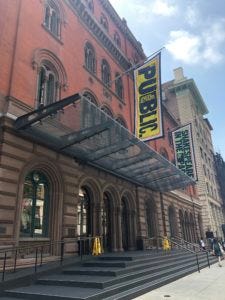‘HAMILTON’-ENDOWED PUBLIC THEATER DELAYS FURLOUGHS WITH $4 MILLION OF U.S. AID
EXCLUSIVE: The Public Theater, which has earned tens of millions of dollars launching Hamilton, received federal assistance meant to preserve jobs threatened by the pandemic.
The Public borrowed roughly $4 million through the Paycheck Protection Program, according to Shareeza Bhola, a spokeswoman for the nonprofit. The loans, which are overseen by the Treasury Department and Small Business Administration, may be forgiven when borrowers spend at least 75 percent of the money on payroll over eight weeks.

On May 1, the company delayed previously-announced furloughs for 160 staffers. In covering two months of the organization's operating costs and salary for 70 percent of staff, the loan is a "temporary reprieve," Bhola said, that doesn't "resolve the structural issues the performing arts sector faces moving forward."
Thanks to its blockbuster annuity from the Lin-Manuel Miranda musical, the Public's immediate future is more secure than most performing arts companies. The average U.S. arts and culture nonprofit faces a deficit equivalent to 26 percent of annual expenses, according to a study from Southern Methodist University's DataArts and the management consulting firm TRG Arts.
The Public has about $24 million in cash and cash equivalents, said a person familiar with its internal operations. But even without live theater, it faces a daunting monthly nut of about $3 million, which includes payroll, rent and utilities, according to this person. And its future couldn't be more uncertain.
Said Bhola: "If we were to continue without restrictions on spending -- without incoming revenue, without knowing when we can safely resume productions, and knowing that as NY State begins to reopen, we will be among the very last industries in the very last region to come back -- we would be putting The Public in danger."
Before the crisis, the Public reduced its cash reserve -- from $32 million two years ago -- largely because of two long-planned capital projects: a new rehearsal and audition space at 440 Lafayette Street that cost $18 million; and preliminary work ahead of renovating the Delacorte Theater in Central Park. (The Public hopes donors will ultimately fund both projects.)
Its endowment totaled a relatively modest $20 million as of August 2018. Besides spending 4.5 percent every year on operations, the board would consider raiding the endowment only as a last resort and would need the approval of donors and the New York Attorney General's office to extract a significant sum.
For its role in developing Hamilton, which premiered at the Public in February 2015 before moving uptown, the company earns a royalty of box office income and five percent of profit of each production. But no one knows when the show can restart on Broadway, on tour or in London. Also unclear is whether Walt Disney Co.'s plan to stream a movie of Hamilton in July will increase interest in the title or cannibalize box office for the live show. (The Public didn't earn anything from Disney's $75 million deal for worldwide rights to the film, Bhola said.)
Determining whether a PPP loan complies with the ambiguous and evolving guidelines from Treasury and the SBA is more art than science. The Public secured the federally-backed loan as some wealthier nonprofits, including the Aspen Institute and the Latin School of Chicago, returned PPP funds amid a public outcry.
On April 23, after publicly traded companies disclosed getting PPP loans, Treasury said on its web site that borrowers must certify that economic uncertainty "makes this loan request necessary to support the ongoing operations of the applicant.” Borrowers must take into account "their ability to access other sources of liquidity sufficient to support their ongoing operations in a manner that is not significantly detrimental to the business."
Days later, Treasury said that the SBA will review all PPP loans exceeding $2 million in which borrowers seek to keep the money. When the SBA determines that a borrower lacked basis for calling a loan "necessary," it will seek repayment of the outstanding balance.
If the Public is forced to repay its loan, it might have been better off financially leaving the staff furloughs in place. Bhola declined to make Executive Director Patrick Willingham available for an interview. According to the person familiar with the theater, leadership felt they owed it to employees to preserve their jobs as long as possible. And it's best for the institution to have staff working toward an eventual reopening.
"If the loan bites us in the ass, it bites us in the ass," this person said.
Many other nonprofit theater companies have received PPP loans. The U.S. House of Representatives is expected to vote next week on a bill that would give borrowers improved flexibility in how they spend the money. More discretion over the funds could help theater companies that are struggling to pay rent or mortgages on their spaces -- and lack the cash flow that Hamilton provided to the Public.


